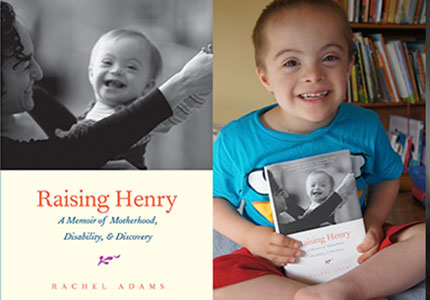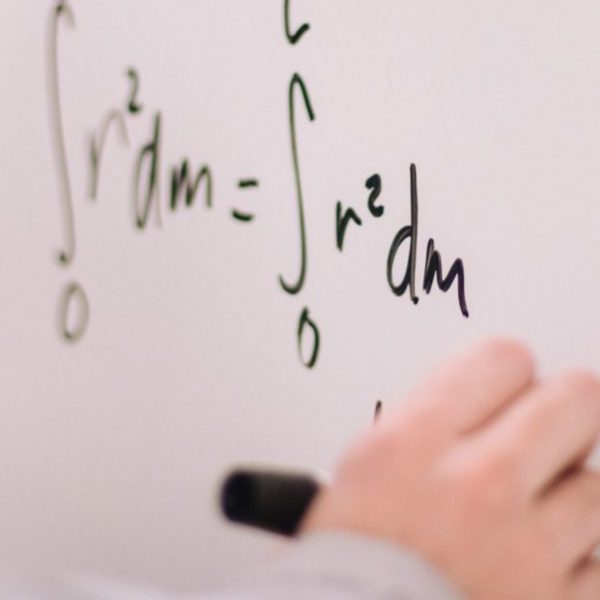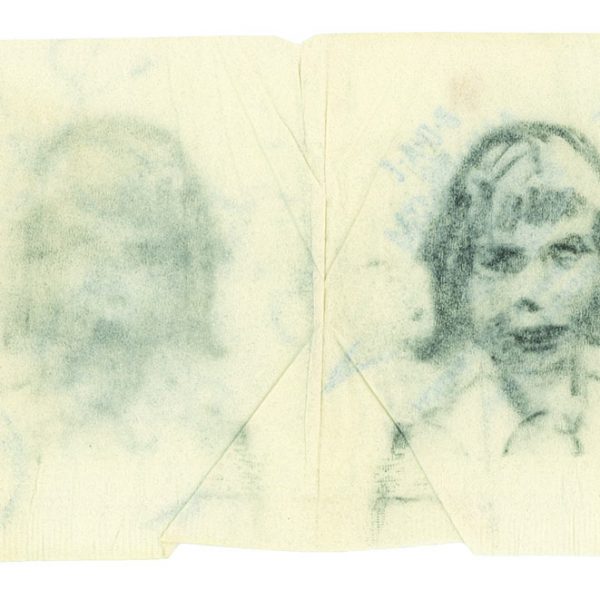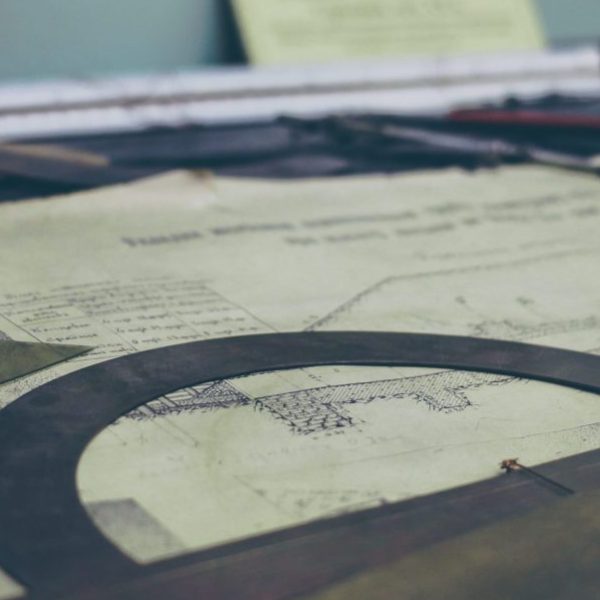A Conversation with Rachel Adams on Raising Henry and a Book Giveaway

Rachel Adams, credit Eileen Barroso
Publishing this month, Rachel Adams‘s Raising Henry: A Memoir of Motherhood, Disability, and Discovery gives a deeply moving and honest account of welcoming a baby born with Down syndrome. Adams, a professor of English and American studies, is also director of the Future of Disability Studies Project at Columbia University. In the interview below, she reveals more of the experiences that inspired her writing and openly addresses the challenges that we face as a society to support children and adults with disabilities, even as our progressive thinking makes further claims for its inclusivity. Goodreads members can enter to win a copy of the book from now until September 30!
Yale University Press: What motivated you to write Raising Henry? Who do you hope your readers will be?
Rachel Adams: I’m a literary critic by training, and when my son Henry was born I immediately turned to literature to try to understand my circumstances. I was dismayed by the lack of reliable, informative reading material about raising a child with Down syndrome, as well as the quantity of misinformation I found in mainstream pregnancy guides and childrearing books. The most heartening read was Michael Berube’s wonderful book—Life as We Know It: A Father, a Family, and an Exceptional Child—about the first years in the life of his son Jamie, who has Down syndrome. Berube presents an ideal combination of information, critique, and narrative. His book doesn’t discount fears but gives hope and a better understanding of the challenges.
Much as I loved Berube’s book, I saw the need for a story told from a mother’s perspective and one that would also address some of the social, political, and scientific changes in the 15 years since Berube had published his book. At first I wrote for myself alone, jotting down notes about my observations and experiences that I hadn’t seen represented elsewhere. Once I started to share my writing, I was gratified by the warm and receptive responses of my readers. I realized that this was a story other people wanted to read and talk about.
I had written several academic books, but Raising Henry came from a very different place. My views were informed by research, but I was speaking about my life experiences and that allowed me to connect with readers in a very different and deeply satisfying way. I very much hope my book will be read by other parents, including those who don’t have children with Down syndrome. I also hope it will be read by doctors and other healthcare professionals, who often have regrettably little understanding of what it is like to raise a child with a genetic disability. Finally, I hope it will be read by teachers and educators and will be assigned to students who are planning careers in education, medicine, or public policy.
YUP: Can you tell us some positive things you have discovered or experienced as the mother of a disabled child?
RA: The most important thing to know is that being the mother of a disabled child brings with it the same experiences of joy, satisfaction, and frustration as being the parent of any other child. The best lesson I’ve learned from Henry is that the world is full of people who have devoted their lives and careers to helping others. Those people had been largely invisible to me until Henry gave them a reason to offer their help to us. My list includes doctors and other healthcare professionals, social workers, teachers, therapists, service coordinators, caregivers, and many, many others who have given their time and energy to helping Henry develop to his full potential and to secure the happiness and health of our family. Although there are many problems with our current healthcare and social welfare systems in this country, we shouldn’t lose sight of the incredible resources that are available to support those with a family member who is disabled.
 YUP: The most challenging part of raising a child with Down syndrome?
YUP: The most challenging part of raising a child with Down syndrome?
RA: We are a family of overachievers, and I’ve always been driven by the desire for perfection. Having a child with Down syndrome caused me to readjust my ideas about merit, accomplishment, and perfection, and to question a society that equates intelligence and autonomy with personhood. This isn’t to say we don’t have high expectations for Henry, and that we don’t value his intellect and the things he has accomplished. But he does things at his own pace and in his own way, and it has been valuable for me to find different ways of appreciating who he is and what he can do.
Henry has also caused me to question the value our society places on independence. In a liberal democracy, personhood is equated with autonomy and self-reliance. Having a child who is disabled forces you to realize the ways we are all dependent on one another, and to appreciate the networks of support that are available to those who need extra help. Before Henry was born, I never wanted to accept help from anyone. Now, I take any help that is offered to me and that, in turn, has made me a more generous and giving person.
YUP: What changes do you hope to see in the medical establishment and educational system with regard to treatment and services offered for people with disabilities? What changes in the world at large?
RA: Having a child with Down syndrome is not a tragedy, and I would like to see doctors receive better training to help prospective parents make decisions about what they hope to get out of having children, and what it might mean to have a person with a disability in the family. Knowing something about the lives of people with genetic disabilities should be required training for all obstetricians, midwives, and pediatric specialists. How can doctors reliably counsel women about prenatal genetic testing if they have no knowledge about what it would be like to have a child with a genetic disability?
As our educational system becomes more inclusive, I look forward to educators learning that children with Down syndrome are as varied in personality and ability as other children. Too often, teachers and school admissions officers assume that a diagnosis tells them all they need to know about a child. Down syndrome becomes an excuse to lower expectations and close off options. Yet many children with Down syndrome are capable of accomplishing a great deal, academically, if they are given the right resources and accommodations. I would like to see an educational system that is better at accommodating the needs of many different kinds of learners so that all children will have the opportunity to succeed and develop to their full potential.
People with disabilities are more visible and have more opportunities than ever before. The self-advocacy movement is teaching people with intellectual disabilities to speak for themselves and to take charge of their own lives. I am heartened at the ongoing push to move people with intellectual disabilities out of institutions and group homes, and to give them opportunities to become members of the community. We need to be sure the resources are there to provide them with adequate support to live according to their full potential.

Henry receives the first finished copy of Raising Henry
YUP: Do you have advice to offer families who are raising a child with a disability?
RA: Regardless of disability, your child is first and foremost a child, with the same need for love, stimulation, and care as other children. Take the help that is offered to you—we live in a society that still offers tremendous resources for the families of children with disabilities, but often only to those who know to ask. Embark on a program of lifelong education, where you become the foremost expert in your child’s needs. You are your child’s best advocate and you must never let other people—no matter what credentials and training they may have—tell you they know what’s best. At the same time, don’t forget that you are not a full-time teacher, doctor, or social worker for your child. Remember to enjoy your child and allow him or her to be a part of your family!
YUP: What political, social, or medical issues relating to disability concern you most?
RA: Whenever it comes time for belt-tightening, services for the poor and for people with disabilities (often one and the same) are almost always the first to be cut. Our society provides some of the best and most extensive supports for people with disabilities at all stages of life. But those resources are fragile and constantly endangered, so we need to do our utmost to preserve them by being active constituents and advocates.
In terms of medical care, I would like to see more attention on improving quality of life for people with genetic disabilities than in trying to develop genetic tests to eradicate them. The funding for improved genetic testing is grossly disproportionate to funding to improve cognitive function in people with Down syndrome. If genetic disabilities come to be seen as preventable conditions, that will adversely affect the resources available to support people with disabilities and their families.
The trend in the United States has been toward inclusive education, giving children with disabilities the right to learn in the least restrictive environment, often alongside their non-disabled peers. This is a very important development that benefits everyone: children with disabilities learn social and academic skills through the modeling of their peers, while those who are not disabled learn about diversity and tolerance. Genuine inclusion is hard work that requires talented and well-trained teachers. The perpetual underfunding of public education makes it more likely that inclusion will be done inadequately, teaching the wrong lessons to everyone involved. In order to preserve the very real benefits of inclusive education, we need to be sure our teachers are adequately trained and compensated for the work that they do.
Goodreads Book Giveaway
Raising Henry
by Rachel Adams
Giveaway ends September 30, 2013.
See the giveaway details
at Goodreads.





